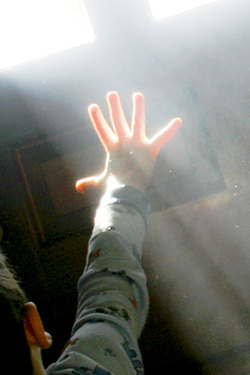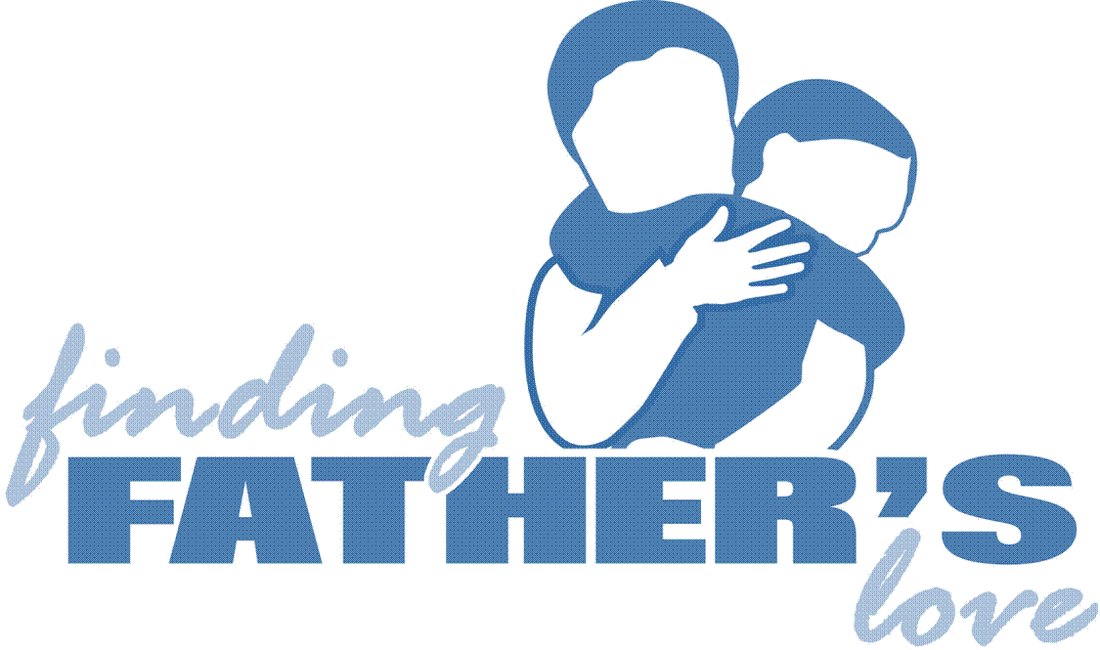
 There are so many people in the world today with “father wounds.” People who have been forsaken, abandoned either physically or emotionally from one who should have been our primary source of encouragement and love. The pain lingers well into our adult lives. There is a void in our soul that only the love of a father can fill. And because of His great compassion for His children, God opens His arms to us and offers to fill that void. Look at these words from Psalm 27: “Even if my father and mother abandon me, the LORD will hold me close.” (v. 10, NLT) God is a Father who will never walk out on His kids. He will never disengage from us. It is against His nature to leave us. We will always have His full attention because we are forever in His embrace. There is no better place to be.  An all-too-common response when we are blindsided by painful circumstances is to blame God. Sometimes we point our finger at Him when things don’t go our way and demand to know why. Our prayers can become confrontational. We ask where on earth He is. We accuse Him of not listening to our pleas and, worse, not caring. We translate our having to endure hardship as God having a hard heart. We make God out to be the enemy. How can you let him treat me like that? How can my being abused be part of Your plan? Why didn’t you heal her? How am I supposed to learn how to trust when people keep letting me down? I thought You loved me! When our cheeks are streaked with tears, overwhelmed by adversity, it is important to know that God, our Heavenly Father, cries right with us. He hurts when we hurt. When we are angry about divorce, deceit, abuse, or death we need to understand that God is angry about those things, too. None of those dreadful difficulties were a part of the world He created for us. His desire was for His kids to live in perfect harmony with each other and with Him. All He wanted was to walk with us, and talk with us, and tell us that we are His own. That was His plan. But sin proved to be the immutable monkey wrench; it destroyed His divine design. It caused a chasm between us and our Creator. No one grieves more about that than God. Sometimes an adversarial relationship with God is a result an ill-founded belief that we deserve better. We may have convinced ourselves, or have been taught to believe by feel-good philosophers or misinformed ministers, that God wants all His children to be happy. If we carry in our chest a sense of entitlement it’s easy to see God as being against us whenever we encounter unhappy experiences. Problem is–and Scripture bears it out–being happy is not God’s deepest desire for our lives. God doesn’t want us to be happy as much as He wants us to be holy. To be holy is to be devoutly dedicated, compassionately committed to God. Our holiness is the pathway to unhindered intimacy with a holy God. He cherishes nothing more than being in close relationship with His children. But God knows us well enough to know that it is hardship, not happiness, that draws us closer to Him. It is in the most difficult times of life that our relationship with Him is solidified, that the bond between us is strengthened, that our faith in the Heavenly Father is set in stone. Whenever we see God as the enemy and blame Him for the trials we face we create distance between us and Him. We separate ourselves from the One who can save us. Whenever we encounter adversity we must see that God is our greatest ally. Nothing or no one else can equip us with the strength, peace, encouragement, and hope that He provides. He still longs to walk with us and talk with us and tell us we are His own.  There are three rules in dysfunctional family systems: 1. Don’t talk. 2. Don’t trust. 3. Don’t feel. We learn at an early age not to talk about family problems. We keep them to ourselves either because we are embarrassed about what’s going on or because we’re convinced no one could possibly relate. So we stuff our family stuff. We learn not to trust others. Children are, by nature, very trusting. Not trusting is a learned behavior. When children are unable to trust you can be sure it is because their trust has been violated by someone close to them. When children find they can’t talk freely about what is going on in their life, and when they are distrusting of those around them, they tend to shut down emotionally. They “turn off” feelings like anger, fear, or sadness because they have nowhere to go with them anyway. Following these three rules as children makes sense. Kids somehow believe that by not talking, not trusting, and not feeling their suffering will be lessened. But continuing to keep to these rules as adults can have serious consequences. Adhering to these rules as grownups does not protect us from hardship. It prevents us from wholeness. The first step successfully putting our past behind us is to break the rules. We must talk about the things that caused and, more than likely, continue to cause so much pain. We must bring to the surface those things we didn’t or weren’t allowed to talk about. Our dark family secrets must be brought into the light if we are ever to strip them of their power. We can’t ignore them. We can’t go around them. We must talk through them. The key to breaking the “don’t talk” rule is to first break the “don’t trust” rule. We must find safe people we can talk to. People who have our best interests in mind. People we can be comfortable confiding in. People who won't judge us. People we can trust. As we seek to recover from a painful past we must assemble a support base of trust-worthy people and lean on them often. Yes, this involves risk. But it is a risk worth taking. Trust is the single most important element to a healthy relationship. So find a counselor. Talk to a pastor. Confide in a friend. Trust does not come easy. It can be downright terrifying. Know that going in. But learning to trust is crucial to our recovery. And, finally, we must learn how to feel. When we’ve found people we can trust, when we’ve discovered that we can talk about things we may have never talked about before, we must begin to deal with any and all feelings that may pop to the surface. We must identify and process the feelings we have spent a lifetime trying to suppress. We must actually feel what we feel and feel the feelings all the way through before we can finally be done with them. That is the only way the pain of our past will no longer pervade our present. Does the pain and trauma of a difficult childhood still hang like a dark cloud over your adult life? Maybe it’s time to break the rules.  Some of us are living our lives in FAST-FORWARD--always rushing ahead, continually striving for a better future. Others are stuck on REWIND--constantly looking back, rehashing the pain and disappointment of the past. Perhaps it's time to switch to PLAY mode--to simply enjoy life in real time, savoring every second we have with a Father who offers us the hope and healing we're looking for.  Fear says, "You're on your own." God says, "I wouldn't think of leaving you." Fear says, "You can't do anything." God says, "With my help, you can do all things." Fear says, "You have no purpose." God says, "I have a specific plan that only you can accomplish." Fear says, "God has given up on you." God says, "I've made an enormous investment in you. I will never stop pursuing you." Fear says, "Give up. Your situation is hopeless." God says, "I am the Hope of the world." Fear says, "No one would love you if they really knew you." God says, "There's nothing you could do that would make me stop loving you." Overcoming our fears is a matter of listening to the right voice.  (Excerpt from When Father is a Bad Word) There is a direct parallel between how we experience our fathers and how we experience our God. The toxins from a strained or non-existent father-child relationship can be lethal to our relationship with God. If our home life was poisoned by our father’s anger or abuse, or perhaps his ambivalence or absence, there is a strong likelihood our spiritual life will be tainted as we experience our Heavenly Father in much the same way. The misconceptions of who God really is are devastating. They have led some to reject God altogether. Even the thought of entering a relationship with a Heavenly Father makes us sick to our stomach. We convince ourselves that it’s not worth the risk; that if we just walk away we will be better off. But the sad reality is when we walk away from our Heavenly Father we are turning our backs on the only One who can provide healing for our father wounds. |
Free eBook!Join My Mailing List For Email Marketing you can trust. Sign up above to receive my blog posts via email and get a free copy of my ebook, 5 Steps Toward Trusting God.
Privacy Guarantee: Your email will not be shared with anyone else.
Archives
March 2019
Categories
All
Helpful Sites |






 RSS Feed
RSS Feed